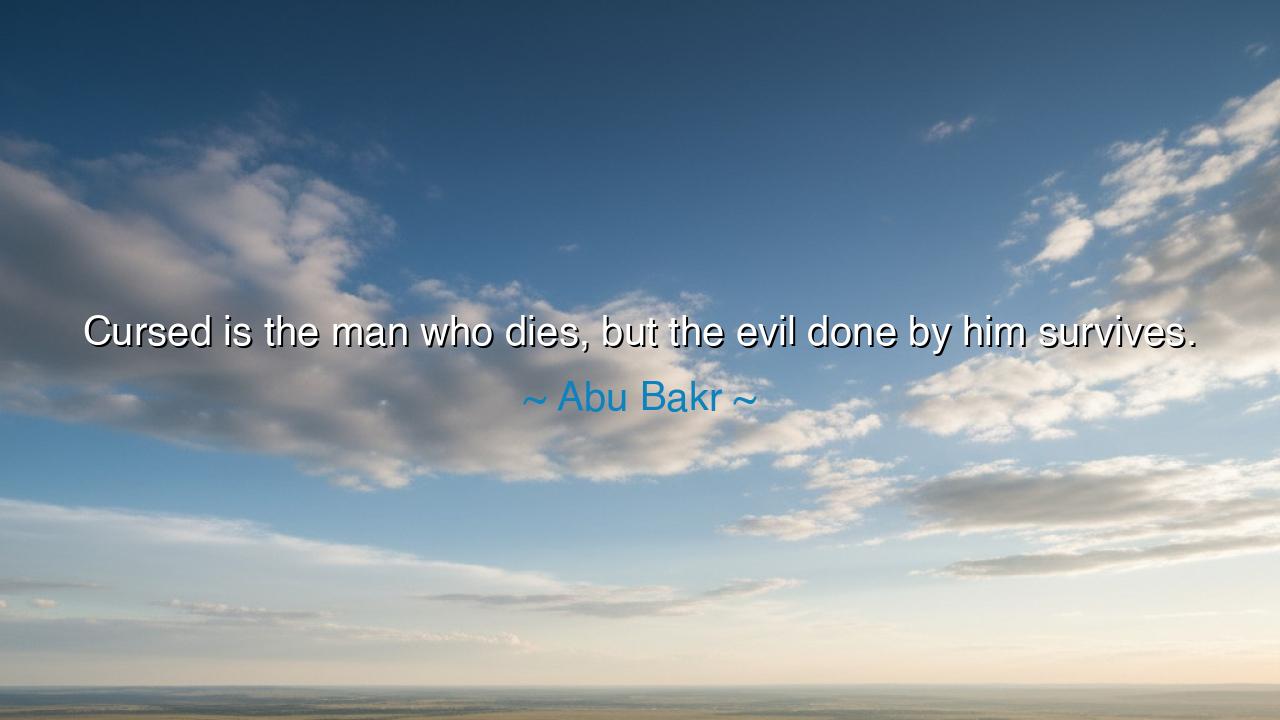
Cursed is the man who dies, but the evil done by him survives.






The great and noble Abu Bakr, the first Caliph after the Prophet Muhammad (peace be upon him), once spoke these solemn and piercing words: “Cursed is the man who dies, but the evil done by him survives.” In this brief saying lies a wisdom as deep as time itself—a warning to all who walk the earth and wield the power of influence. It reminds us that death does not end the legacy of a man. His body may return to dust, but the deeds of his life—good or evil—continue to echo through the hearts and histories of others. And thus, the man whose cruelty or injustice endures beyond his death is not only cursed in memory, but cursed in spirit, for his shadow still darkens the living world.
To die is the fate of all mortals; it is the great equalizer before which kings and beggars alike must bow. But what truly matters is what follows that final breath. Abu Bakr, a man known for his piety, justice, and humility, understood that the measure of one’s life is not in its length or power, but in the legacy it leaves behind. The man who dies and leaves behind kindness, wisdom, or mercy continues to live in the blessings he has planted. But the one whose deceit, oppression, or hatred outlives him has chained his soul to his own wrongdoing. In this way, evil becomes a haunting spirit—an inheritance that poisons generations yet unborn.
The origin of this teaching can be traced to Abu Bakr’s life as a leader of faith and conscience. When he succeeded the Prophet Muhammad as Caliph, he bore the immense responsibility of guiding a young and fragile community. His words were born not from theory, but from experience. He had seen men whose ambitions outlived them—whose thirst for power and cruelty left divisions that outlasted their bones. His warning was not against death itself, but against a far greater tragedy: to leave behind evil that endures, corrupting the souls of others long after one’s own has departed.
History gives us many examples of the truth in Abu Bakr’s words. Consider Adolf Hitler, whose body perished in a bunker long ago, yet whose ideology of hatred and destruction still infects hearts around the world. Though the man is gone, the evil done by him survives—in prejudice, in violence, in the fearful whisper that divides humanity. Or think of those tyrants whose monuments have crumbled, but whose cruelty still scars the earth they once ruled. Their deaths did not end their curse, for their ideas and actions lingered, breeding new suffering from old wounds.
Yet contrast them with the souls whose goodness survives beyond the grave. Consider Mother Teresa, who left no wealth or armies behind, but whose acts of compassion continue to inspire mercy in countless hearts. Or Abraham Lincoln, who fell to an assassin’s bullet, but whose vision of unity still guides a divided nation. Their lives prove the mirror truth of Abu Bakr’s warning: that just as evil can live on and curse its maker, so can goodness live on and bless its creator. The wise understand this duality, and therefore live each day with an awareness that their deeds are seeds—some will bloom in beauty, and others in poison.
Abu Bakr’s words are not merely a condemnation—they are a call to conscious living. Every thought we share, every act we perform, ripples outward into the world. What we say to a child, what we build or destroy in anger, what we justify in the name of pride—all these outlast our bodies. Therefore, one must ask: What will survive of me when I am gone? This question is the true measure of moral maturity. For the one who lives with awareness of his legacy will act with restraint, mercy, and purpose, while the one who lives blindly will scatter harm as though it were nothing, never knowing the curse he prepares for himself.
So, my child, take heed of this ancient truth: Death ends a man’s life, but not his influence. Live, then, as though every deed were eternal, for in a way, it is. Do not let anger or greed plant seeds that will outlast your days and wound others in your name. Strive instead to plant kindness, truth, and justice, that the world may remember you not with curses, but with prayers. For the righteous man dies once, but his goodness lives on; the wicked man dies, yet his evil binds him forever.
Therefore, let your hands build what is pure, your words heal what is broken, and your heart sow what is just. For when the day of your passing comes—and it surely will—you will stand before your Maker freed from the curse of lingering harm. And your memory, instead of being a shadow upon the world, will shine like a light that endures beyond the grave, guiding others to goodness, as Abu Bakr’s wisdom has guided us through the centuries.






AAdministratorAdministrator
Welcome, honored guests. Please leave a comment, we will respond soon